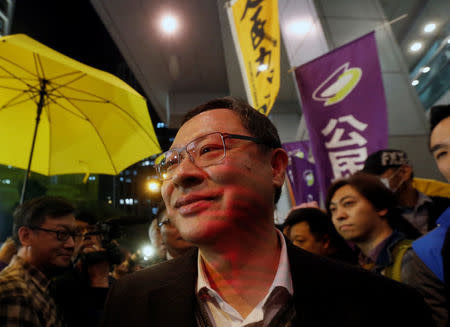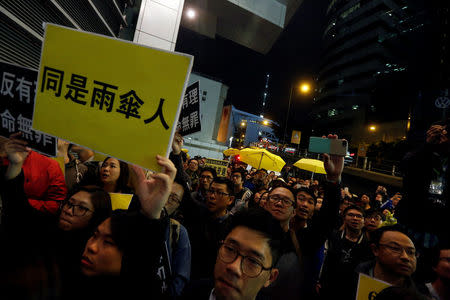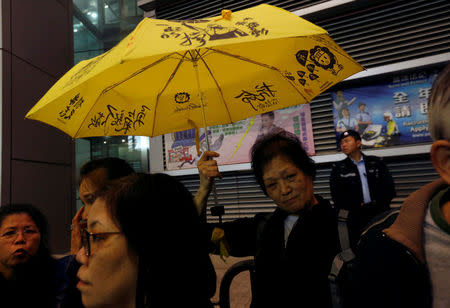Hong Kong protest leaders charged day after new leader chosen
By Venus Wu and James Pomfret HONG KONG (Reuters) - Hong Kong police on Monday charged nine organisers of the 2014 pro-democracy demonstrations, just a day after a new Beijing-backed leader was chosen, vowing to unite society. The move provoked anger and disbelief among protesters and heightened political tension in the Chinese-ruled city. "We want real universal suffrage," over 100 supporters wielding yellow umbrellas, a symbol of the 2014 protests, shouted outside the Wanchai police headquarters on Monday night as the nine organisers went inside, pumping their fists into the air. “Never give up.” Former chief secretary Carrie Lam was chosen on Sunday by a 1,200-person committee to lead the city, pledging in her victory speech to unite political divisions that have hindered policy-making and legislative work. The protest leaders dubbed "the Occupy trio" - law professor Benny Tai, sociology professor Chan Kin-man and Reverend Chu Yiu-ming - were each charged with conspiracy to commit public nuisance, incitement to commit public nuisance and incitement to incite public nuisance. The charges carry a maximum sentence of seven years, Tai said, adding the activists might plead guilty, in a spirit of civil disobedience. Six others including two legislators and two former student protest leaders were also charged with crimes related to public nuisance during the 2014 unrest, which brought parts of the city to a standstill for months. "I am already mentally prepared for this, but I am very worried about Hong Kong's future," Chan told Reuters. TIMING "ALARMING" Amnesty International's China researcher William Nee called the timing of the prosecutions "very alarming". "They've had years to consider these cases and they just decided to do this now. It does naturally make one think that political considerations might be at play," Nee said. It was not clear why authorities had waited so long to pursue the charges. The Department of Justice (DoJ) said in a statement the prosecution “should not be politicised”. “Some people in the community surmise that action was taken against those involved in the ‘Occupy Movement’ today because they were so instructed by the Chief Executive-elect, Mrs Carrie Lam,” it said. “The DoJ stresses that such surmising is completely baseless and utterly untrue.” The police arrested a total of 1,003 people in relation to the protests, of which 216 had been charged as of end of January, the Secretary for Justice said last month. That included student protest leader Joshua Wong, who was found guilty of unlawful assembly but was spared jail time. Separately, a former senior police officer who was filmed beating passersby with his baton during the 2014 protests was charged later on Monday with assault. Asked by reporters about the timing of the charges against the protesters, Lam said she did not know about the prosecutions beforehand and could not intervene with prosecutions carried out by the administration of incumbent leader Leung Chun-ying. "I made it very clear that I want to unite society and bridge the divide that has been causing us concern, but all these actions should not compromise the rule of law in Hong Kong and also the independent prosecution process that I have just mentioned," said Lam, who will take office on July 1. Chan disputed this. "The message is strong. Carrie Lam said she wanted to mend the society, but the message we got today is prosecution. I don't see how the society's cracks can be mended," Chan told Reuters. CHINA'S XI TO VISIT IN JULY? Hong Kong was returned from British to Chinese rule in 1997, with the promise of a high degree of autonomy and other freedoms not enjoyed on the mainland. But Communist Party rulers in Beijing never hid their anger at the protests, which they called illegal. Lam met with incumbent leader Leung earlier on Monday. They shook hands and expressed confidence in a "smooth and effective" leadership transition. Lam has been Leung's deputy as chief secretary for the past five years and is known as a tough, competent administrator. The next few months will be critical for Leung and Lam, with Chinese President Xi Jinping expected to pay a visit on July 1 to celebrate the 20th anniversary of Hong Kong's handover, with large protests expected. Part of the public mistrust towards Lam stems from her close working relationship with the staunchly pro-Beijing Leung, who protesters say ordered the firing of tear gas at them in 2014. "She has been elected pretty much solely on the support of Beijing," said political scientist Ma Ngok. "If that's the case, she might have a lot of debts that she has to repay to her supporters in Beijing." When Lam on Monday toured neighbourhoods to thank the public - who had no votes in her appointment - one elderly man wagged a finger at her and urged her to "serve Hong Kong people, not mainland China", according to Cable TV footage. Student activist Joshua Wong, 20, one of the leaders of the 2014 protests, said Lam's appointment was a "nightmare" for Hong Kong. "Theoretically, the chief executive is a bridge between the central government and the Hong Kong people," he said. "But Lam will be a tilted bridge. She will only tell us what Beijing wants and won't reflect what the people want to the communist regime." (Additional reporting by Katy Wong and Joyce Zhou; Editing by Andrew Roche)

 Yahoo News
Yahoo News 


